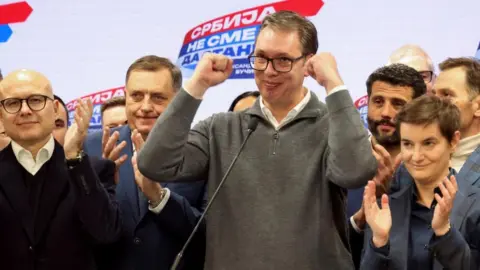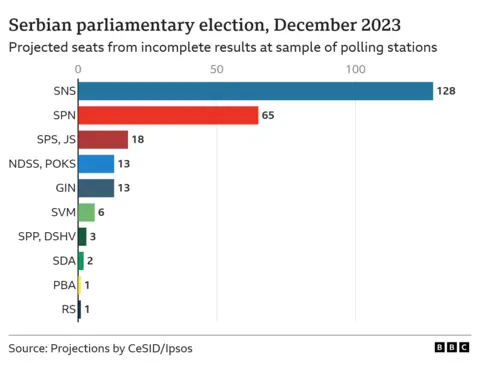Serbia election: Vucic claims big election victory for ruling party
 Reuters/Zorana Jevtic
Reuters/Zorana JevticSerbian President Aleksandar Vucic has claimed victory in snap parliamentary elections, saying his party is heading for an absolute majority.
His Serbian Progressive Party, or SNS, won 47% of the vote, according to a near-final count.
Opposition parties under the Serbia Against Violence (SPN) banner were well behind with around 23%.
But they claimed electoral fraud favouring the government, and called a protest for Monday evening.
If confirmed, the results will likely mean the SNS has won more than half of the 250 seats in the National Assembly.
Joined by Prime Minister Ana Brnabic and controversial Bosnian Serb leader Milorad Dodik on stage, Mr Vucic told supporters: "My job was to do everything in my power to secure an absolute majority," although he himself was not running for election.
As well as voting for parliament, Serbians were deciding on Sunday who would control 65 local authorities.
The loose opposition SPN alliance had hoped to win control of Belgrade in Sunday's local elections.
It was formed after two mass shootings in May which sparked huge protests. The attacks killed 19 people, including 10 at a school in Belgrade.
Despite the SPN's hopes, near-final results showed Mr Vucic's party slightly ahead in the capital.
In a statement, SPN claimed electoral fraud. The coalition said: "More than 40,000 non-residents were brought to Belgrade".
It demanded the annulment of the vote in the capital, and called on supporters to protest on Monday evening.
But President Vucic told supporters that the party had seen off the opposition challenge in Belgrade and that he was confident the capital would once again be run by former water polo star Aleksandar Sapic, who merged his party with the Progressives.


The vote was almost immediately marred by accusations of irregularities.
The International Election Observation Mission said in a statement that "serious irregularities, including vote-buying and ballot box stuffing were observed".
The SNS has been in power since 2012 but there have been three elections in the past three years.
Opposition figures have accused the SNS of using public resources for political purposes and election monitor CRTA complained before the vote of a "chronic lack of pluralism" in Serbia.
Turnout nationally was estimated at 59.1%.
Local observers reported various irregularities on Sunday, including voters being bussed in from Bosnia-Herzegovina to vote in Belgrade.
The CRTA observer mission gave details of attempted ballot-rigging in a number of polling stations.
Serbia is a candidate to become a member of the European Union, and President Vucic is under pressure from both the EU and the US to normalise relations with Kosovo.
Kosovo declared unilateral independence from Serbia in 2008, and while it is recognised by more than 100 UN members, Serbia has refused to do so - backed by allies like Russia, China and five EU members.
Some 95,000 ethnic Serbs live in Kosovo and those who wanted to vote had to cross into Serbia to cast their ballot.
